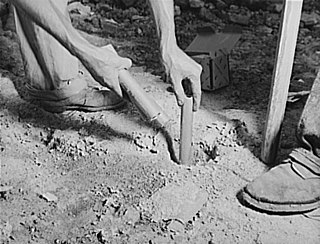
Dynamite is an explosive made of nitroglycerin, sorbents, and stabilizers. It was invented by the Swedish chemist and engineer Alfred Nobel in Geesthacht, Northern Germany, and was patented in 1867. It rapidly gained wide-scale use as a more robust alternative to the traditional black powder explosives. It allows the use of nitroglycerine's favorable explosive properties while greatly reducing its risk of accidental detonation.

Cordite is a family of smokeless propellants developed and produced in Britain since 1889 to replace black powder as a military firearm propellant. Like modern gunpowder, cordite is classified as a low explosive because of its slow burning rates and consequently low brisance. These produce a subsonic deflagration wave rather than the supersonic detonation wave produced by brisants, or high explosives. The hot gases produced by burning gunpowder or cordite generate sufficient pressure to propel a bullet or shell to its target, but not so quickly as to routinely destroy the barrel of the gun.
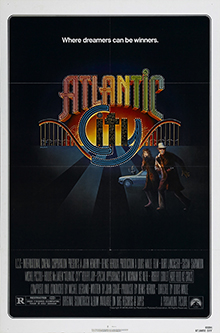
Atlantic City is a 1980 romantic crime film directed by Louis Malle from a screenplay by John Guare. It stars Burt Lancaster and Susan Sarandon in the leading roles, with a supporting cast featuring Kate Reid, Michel Piccoli, Robert Joy, Hollis McLaren, and Al Waxman. A co-production between French and Canadian companies filmed in late 1979, it was released in France and Germany in September 1980 and in the United States later that year by Paramount Pictures.

A shell, in a military context, is a projectile whose payload contains an explosive, incendiary, or other chemical filling. Originally it was called a bombshell, but "shell" has come to be unambiguous in a military context. A shell can hold a tracer.

The Absent-Minded Professor is a 1961 American science fiction comedy film directed by Robert Stevenson and produced by Walt Disney Productions. It is based on the 1943 short story "A Situation of Gravity" by Samuel W. Taylor. The title character was based in part on Hubert Alyea, a professor emeritus of chemistry at Princeton University, who was known as "Dr. Boom" for his explosive demonstrations. The film stars Fred MacMurray as Professor Ned Brainard, alongside Nancy Olson, Keenan Wynn, Tommy Kirk, Leon Ames, Elliott Reid, and Edward Andrews. The plot follows Brainard as he invents a substance that defies gravity, which he later exploits through various means.
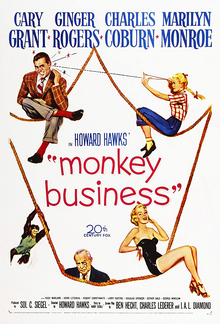
Monkey Business is a 1952 American screwball comedy film directed by Howard Hawks and starring Cary Grant, Ginger Rogers, Charles Coburn, and Marilyn Monroe. To avoid confusion with the unrelated 1931 Marx Brothers film of the same name, this film is sometimes referred to as Howard Hawks' Monkey Business.
ROF Thorp Arch was one of sixteen Second World War, UK government-owned Royal Ordnance Factory, which produced munitions by "filling" them. It was a medium-sized filling factory.

A filling factory was a manufacturing plant that specialised in filling various munitions, such as bombs, shells, cartridges, pyrotechnics, and screening smokes. In the United Kingdom, during both world wars of the 20th century, the majority of the employees were women.

Penrhyndeudraeth is a small town and community in the Welsh county of Gwynedd. The town is close to the mouth of the River Dwyryd on the A487 nearly 3 miles (4.8 km) east of Porthmadog, and had a population of 2,150 at the 2011 census, increased from 2,031 in 2001. The community includes the villages of Minffordd and Portmeirion.
Canadian Industries Limited, also known as C-I-L, is a Canadian chemicals manufacturer. Products include paints, fertilizers and pesticides, and explosives. It was formed in 1910 by the merger of five Canadian explosives companies. It was until recently a subsidiary of Imperial Chemical Industries until ICI was purchased by AkzoNobel.

H. M. Factory, Gretna was Britain's largest cordite factory in World War I. The government-owned facility was adjacent to the Solway Firth, near Gretna, Dumfries and Galloway. It was built by the Ministry of Munitions in response to the Shell Crisis of 1915. The capital cost was £9,184,000 and it covered 9,000 acres (3,600 ha). The cost of working it from September 1916 to September 1918 was £12,769,000, during which time it produced cordite valued at £15,000,000, though it was claimed that without it the cordite would have had to be imported from the USA at a cost of £23,600,000.
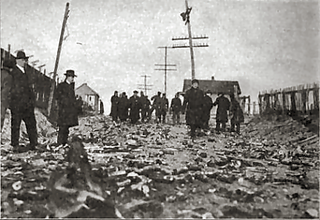
The Kingsland explosion was an incident that took place during World War I at a munitions factory in Lyndhurst, New Jersey, United States, on January 11, 1917. An arbitration commission in 1931 determined that, "In the Kingsland Case the Commission finds upon the evidence that the fire was not caused by any German agent." However, in 1953, Germany paid $50 million in reparations to the United States.
Barwick, Great Barwick, and Little Barwick are hamlets in the civil parish of Standon in Hertfordshire, England. They are near the A10 road and the village of Much Hadham and the hamlet of Latchford. The River Rib flows behind Barwick and through Great Barwick. There is a ford crossing at Great Barwick.
The Chemist is a 1936 American short comedy film featuring Buster Keaton.

Faversham, in Kent, England, has claims to be the cradle of the UK's explosives industry: it was also to become one of its main centres. The first gunpowder plant in the UK was established in the 16th century, possibly at the instigation of the abbey at Faversham. With their estates and endowments, monasteries were keen to invest in promising technology.
Krakatit is a 1948 Czechoslovak science fiction mystery film directed by Otakar Vávra, starring Karel Höger as a chemist who suffers from delirium and regret after inventing a powerful explosive. The film is based on Karel Čapek's novel with the same title, written in 1922. The name is derived from the volcano Krakatoa, which violently erupted in 1883.
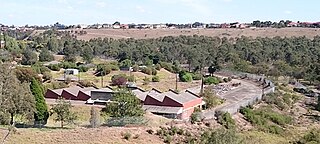
Defence Explosive Factory Maribyrnong is a heritage-listed military installation and former munitions factory at Cordite Avenue, Maribyrnong, Victoria, Australia. It was added to the Australian Commonwealth Heritage List on 22 June 2004.

The Flubber franchise consists of American science-fiction-comedy films, with three theatrical releases, and two made-for-television films. The overall story is based on the short story, A Situation of Gravity, written by Samuel W. Taylor in 1943. The plot of the films center around an absent-minded college professor, who works tirelessly to find the next great invention. The Professor wants to make scientific history, while working to save the school at which he works, the Medfield College.
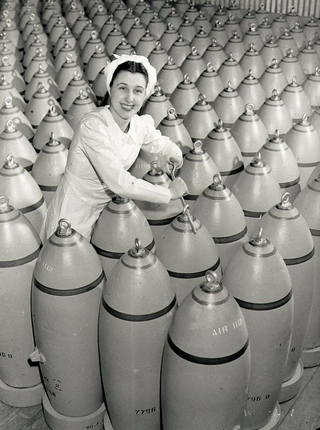
Defence Industries Limited (DIL) was a subsidiary of Canadian Industries Limited (C-I-L), founded in 1939 to manufacture munitions for use in World War II. The company operated in number of locations in Canada, in the provinces of Ontario, Quebec, and Manitoba. Its Pickering Works shell-filling plant, along with nearby housing, grew into the town of Ajax.














